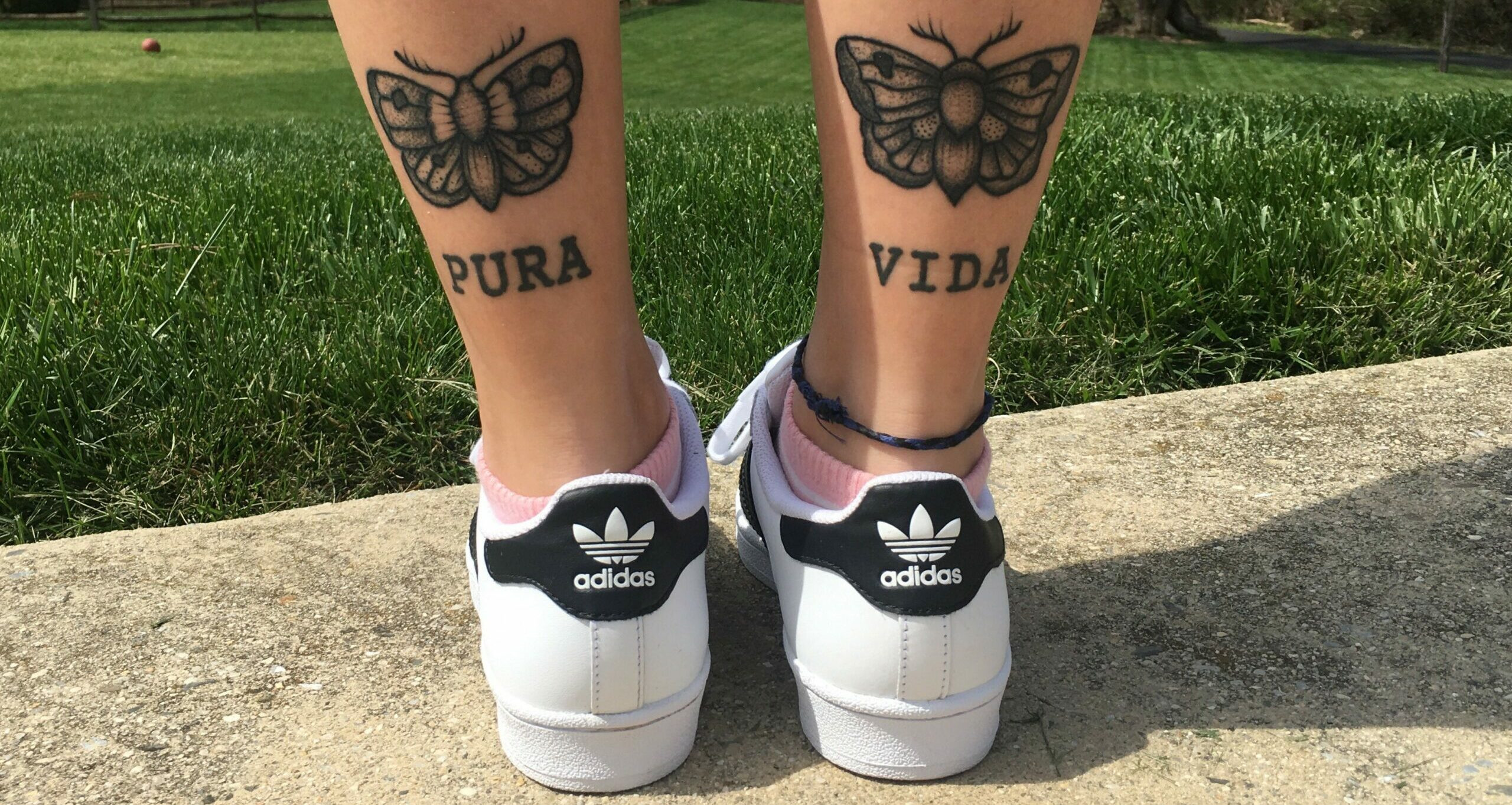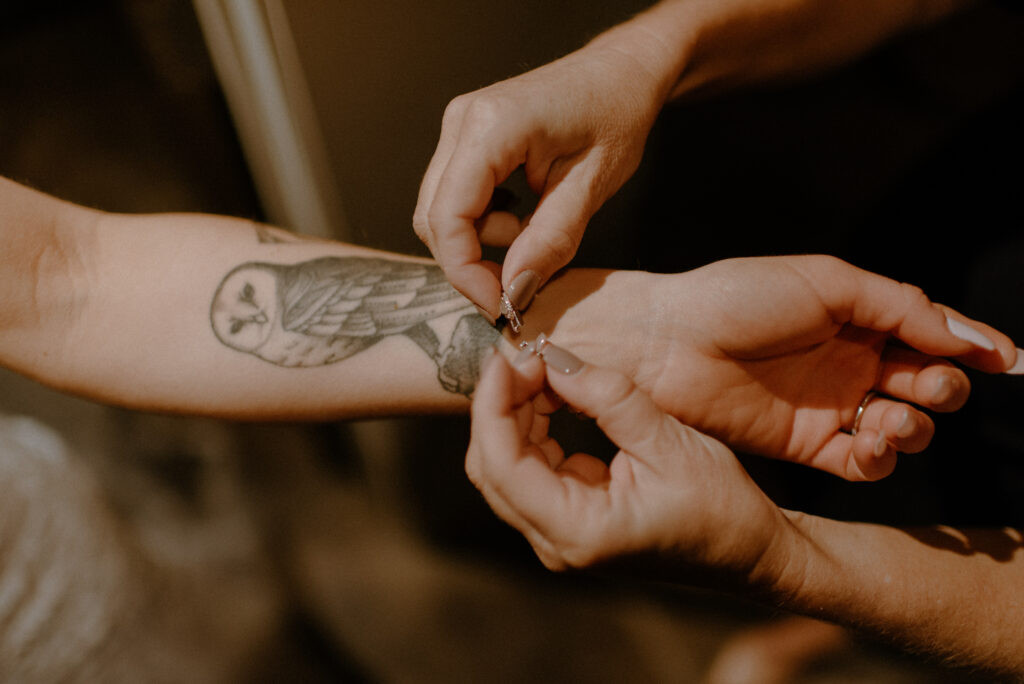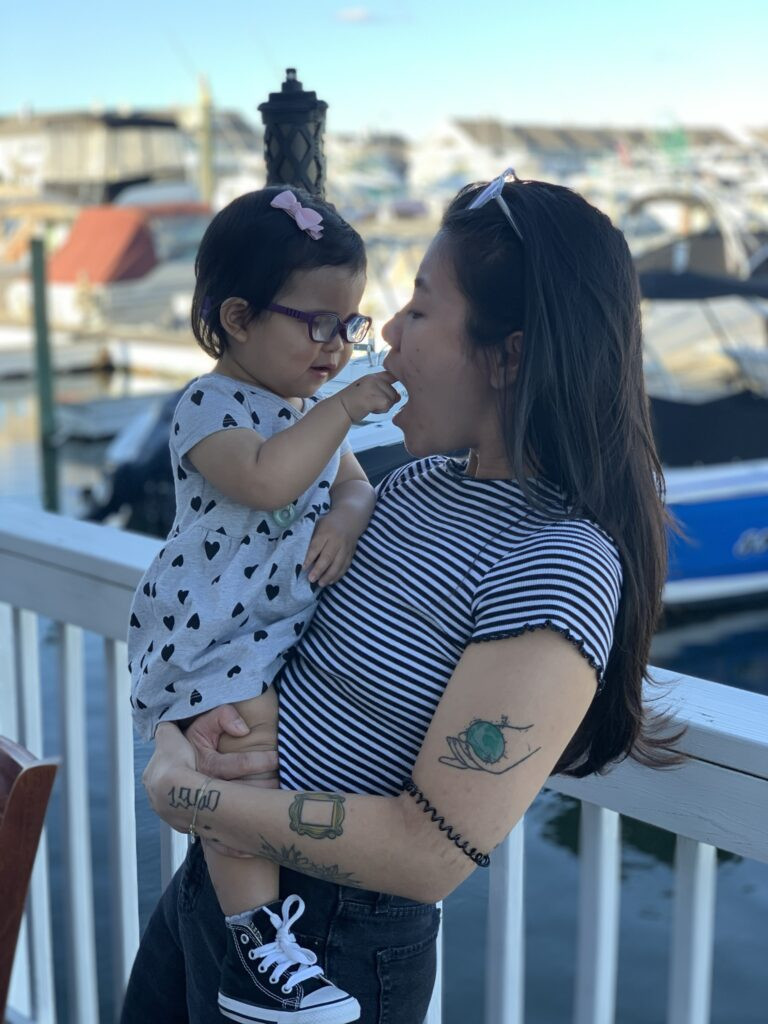Can I Get A Tattoo With Eczema? Absolutely, understanding the considerations is crucial for a safe and satisfying experience, and tattooat.com provides guidance. Getting inked with eczema requires careful planning, including choosing the right artist and taking precautions. For design inspiration, expert advice, and a curated list of tattoo artists and studios, explore tattooat.com. Discover the art of tattooing while prioritizing your skin’s health, embracing body art, skin art, and unique skin designs.
1. Understanding Eczema and Tattoos
1.1. What is Eczema?
Eczema, also known as atopic dermatitis, is a chronic inflammatory skin condition characterized by dry, itchy, and inflamed skin. It affects millions worldwide, with flare-ups triggered by various factors such as allergens, irritants, stress, and weather changes.
1.2. How Can Eczema Affect Tattooing?
Eczema can pose challenges to the tattooing process due to the skin’s compromised barrier function and increased sensitivity. Tattooing involves repeatedly puncturing the skin with needles to deposit ink, which can further irritate eczema-prone skin, potentially leading to flare-ups, infections, and poor tattoo healing.
1.3. Key Considerations for Tattooing with Eczema
- Flare-Ups: Avoid tattooing during eczema flare-ups, as inflamed skin is more susceptible to irritation and infection.
- Location: Choose tattoo locations carefully, avoiding areas prone to eczema or where the skin is thin and sensitive.
- Artist Expertise: Select a tattoo artist experienced in working with sensitive skin conditions like eczema.
- Ink Sensitivity: Be aware of potential allergic reactions to tattoo inks, especially colored inks.
- Aftercare: Meticulous aftercare is crucial to prevent infection and promote proper healing.
 Close-up of eczema on skin, highlighting its dry and inflamed appearance
Close-up of eczema on skin, highlighting its dry and inflamed appearance
2. Assessing Your Eczema and Tattoo Suitability
2.1. Consulting a Dermatologist
Before getting a tattoo, consult a dermatologist to assess the severity of your eczema and determine if tattooing is advisable. A dermatologist can provide personalized recommendations based on your skin condition and medical history.
2.2. Evaluating Eczema Severity and Stability
Consider the severity and stability of your eczema. If your eczema is well-controlled with minimal flare-ups, the risk of complications from tattooing may be lower. However, if your eczema is severe or frequently flares up, tattooing may not be recommended.
2.3. Identifying Trigger Factors
Identify your eczema trigger factors and avoid them before and after getting a tattoo. Common triggers include allergens, irritants, stress, and certain foods. Minimizing exposure to these triggers can help reduce the risk of flare-ups.
2.4. Patch Testing
Consider undergoing patch testing to identify any potential allergies or sensitivities to tattoo inks. Patch testing involves applying small amounts of different inks to the skin and monitoring for allergic reactions.
3. Choosing the Right Tattoo Artist and Studio
3.1. Experience with Eczema or Sensitive Skin
Seek out a tattoo artist with experience working with eczema or other sensitive skin conditions. An experienced artist will understand the unique challenges of tattooing eczema-prone skin and take necessary precautions.
3.2. Studio Hygiene and Sterilization Practices
Ensure the tattoo studio adheres to strict hygiene and sterilization practices. This includes using sterile equipment, disposable needles, and proper hand hygiene. A clean and sterile environment minimizes the risk of infection.
3.3. Consultation and Communication
Schedule a consultation with the tattoo artist to discuss your eczema, concerns, and tattoo design. Effective communication is essential to ensure the artist understands your needs and can provide appropriate recommendations.
3.4. Reviewing Portfolio and Client Testimonials
Review the artist’s portfolio and read client testimonials to assess their skills, experience, and professionalism. Look for examples of tattoos on clients with sensitive skin or similar skin conditions.
4. Preparing Your Skin for a Tattoo
4.1. Moisturizing and Hydrating
Keep your skin well-moisturized and hydrated in the weeks leading up to your tattoo appointment. Apply a fragrance-free, hypoallergenic moisturizer regularly to strengthen the skin barrier.
4.2. Avoiding Irritants and Allergens
Avoid using harsh soaps, lotions, or other skincare products that may irritate your skin. Choose gentle, fragrance-free products specifically designed for sensitive skin.
4.3. Managing Stress
Practice stress-reducing techniques such as yoga, meditation, or deep breathing exercises. Stress can trigger eczema flare-ups, so managing stress levels is crucial before and after getting a tattoo.
4.4. Avoiding Sunburn
Protect your skin from sunburn in the weeks leading up to your tattoo appointment. Sunburned skin is more sensitive and prone to irritation, increasing the risk of complications from tattooing.
5. Tattoo Placement and Design Considerations
5.1. Avoiding Eczema-Prone Areas
Choose tattoo locations carefully, avoiding areas prone to eczema flare-ups. Common eczema-prone areas include the elbows, knees, wrists, and ankles.
5.2. Selecting Low-Friction Areas
Opt for tattoo locations with minimal friction from clothing or other surfaces. Friction can irritate the skin and increase the risk of flare-ups.
5.3. Considering Tattoo Size and Complexity
Consider the size and complexity of your tattoo design. Smaller, simpler designs may be less likely to cause irritation than larger, more intricate designs.
5.4. Avoiding Certain Ink Colors
Be cautious with colored tattoo inks, as some colors are more likely to cause allergic reactions than others. Red, yellow, and green inks are known to be common allergens. Black ink is generally considered the safest option.
6. The Tattooing Process: Precautions and Modifications
6.1. Communicating with the Artist
Clearly communicate your eczema to the tattoo artist and any specific concerns or sensitivities you may have. Work together to modify the tattooing process as needed to minimize irritation.
6.2. Using Hypoallergenic Inks
Request hypoallergenic tattoo inks that are less likely to cause allergic reactions. These inks are formulated without common allergens and irritants.
6.3. Gentle Tattooing Techniques
Encourage the tattoo artist to use gentle tattooing techniques to minimize trauma to the skin. This may involve using lighter pressure and fewer passes with the needle.
6.4. Frequent Breaks
Take frequent breaks during the tattooing process to allow your skin to rest and recover. This can help prevent over-irritation and reduce the risk of flare-ups.
7. Aftercare: Essential Steps for Healing
7.1. Following Artist’s Instructions
Follow the tattoo artist’s aftercare instructions carefully. These instructions are tailored to your specific tattoo and skin type and are essential for proper healing.
7.2. Keeping the Tattoo Clean and Dry
Keep the tattoo clean and dry to prevent infection. Gently wash the tattoo with a mild, fragrance-free soap and pat it dry with a clean towel.
7.3. Applying a Hypoallergenic Ointment
Apply a thin layer of a hypoallergenic, fragrance-free ointment to the tattoo to keep it moisturized and protected. Avoid using petroleum-based products, as they can trap moisture and increase the risk of infection.
7.4. Avoiding Scratching or Picking
Avoid scratching or picking at the tattoo, as this can damage the skin and increase the risk of infection. If the tattoo is itchy, gently pat it with your hand instead of scratching.
7.5. Protecting from Sun Exposure
Protect the tattoo from sun exposure by wearing loose-fitting clothing or applying a fragrance-free, hypoallergenic sunscreen with a high SPF. Sun exposure can fade the tattoo and increase the risk of irritation.
 Tattoo artist applying stencil to client's skin, preparing for tattoo session
Tattoo artist applying stencil to client's skin, preparing for tattoo session
8. Monitoring for Complications
8.1. Recognizing Signs of Infection
Be vigilant for signs of infection, such as redness, swelling, pain, pus, or fever. If you suspect an infection, seek medical attention immediately.
8.2. Identifying Allergic Reactions
Watch for signs of allergic reactions, such as itching, rash, hives, or difficulty breathing. If you experience an allergic reaction, seek medical attention immediately.
8.3. Managing Flare-Ups
If you experience an eczema flare-up around the tattoo, consult your dermatologist for appropriate treatment. This may involve topical corticosteroids or other medications.
8.4. Seeking Professional Advice
If you have any concerns about the healing of your tattoo, consult your tattoo artist or dermatologist for professional advice.
9. Long-Term Tattoo Care and Eczema Management
9.1. Regular Moisturizing
Continue to moisturize the tattooed area regularly to keep the skin hydrated and prevent dryness.
9.2. Avoiding Irritants
Avoid using harsh soaps, lotions, or other skincare products that may irritate the tattooed area.
9.3. Sun Protection
Protect the tattoo from sun exposure by wearing loose-fitting clothing or applying sunscreen.
9.4. Managing Eczema
Continue to manage your eczema with your dermatologist’s recommended treatment plan.
10. Personal Stories and Experiences
10.1. Success Stories
Many individuals with eczema have successfully gotten tattoos without complications by taking appropriate precautions and working with experienced artists.
10.2. Challenges and Lessons Learned
Some individuals with eczema have experienced challenges with tattooing, such as flare-ups or allergic reactions, but have learned valuable lessons about managing their skin and choosing the right artist and aftercare products.
10.3. Importance of Individualized Approach
Each individual’s experience with tattooing and eczema is unique, and it’s essential to take an individualized approach based on your specific skin condition and medical history.
10.4. Community Support
Connect with other individuals with eczema who have gotten tattoos to share experiences, advice, and support.
 Tattoo artist consulting with client, discussing tattoo design and placement
Tattoo artist consulting with client, discussing tattoo design and placement
11. Finding Inspiration and Resources
11.1. Tattooat.com
Explore tattooat.com for design inspiration, artist recommendations, and informative articles about tattooing and skin health.
11.2. Online Forums and Communities
Join online forums and communities dedicated to tattooing and eczema to connect with other individuals, share experiences, and ask questions.
11.3. Social Media
Follow tattoo artists, dermatologists, and eczema organizations on social media for inspiration, advice, and updates.
11.4. Books and Magazines
Read books and magazines about tattooing and skin health to learn more about the art of tattooing and how to care for your skin.
12. Expert Opinions and Recommendations
12.1. Dermatologists
Dermatologists recommend consulting with a skin care professional before getting a tattoo if you have eczema. They can assess your skin condition, provide personalized recommendations, and help you minimize the risk of complications. According to research from Portland State University’s Art Department, in July 2025, proactive consultation with dermatologists provides optimal outcomes for individuals with eczema considering tattoos.
12.2. Tattoo Artists
Tattoo artists with experience working with eczema or sensitive skin emphasize the importance of communication, hygiene, and gentle tattooing techniques.
12.3. Allergists
Allergists recommend undergoing patch testing to identify potential allergies to tattoo inks. They also advise avoiding tattooing during eczema flare-ups and choosing hypoallergenic inks.
12.4. Eczema Organizations
Eczema organizations provide valuable resources and support for individuals with eczema, including information about tattooing and skin health.
13. Tattoo Styles and Techniques
13.1. Minimalist Tattoos
Minimalist tattoos with simple designs and fine lines may be less likely to cause irritation than more complex tattoos.
13.2. Watercolor Tattoos
Watercolor tattoos, which use diluted inks to create a soft, blended effect, may be gentler on the skin than traditional tattoos.
13.3. Black and Gray Tattoos
Black and gray tattoos, which use only black ink and varying shades of gray, may be less likely to cause allergic reactions than colored tattoos.
13.4. Stick and Poke Tattoos
Stick and poke tattoos, which are applied by hand using a single needle, may be less traumatic to the skin than machine tattoos. However, they require a skilled and experienced artist to ensure proper hygiene and technique.
14. Common Myths and Misconceptions
14.1. People with Eczema Can’t Get Tattoos
This is a myth. While individuals with eczema need to take extra precautions, they can still get tattoos safely by consulting with a dermatologist, choosing an experienced artist, and following proper aftercare.
14.2. Black Ink is Always Safe
While black ink is generally considered the safest option, it can still cause allergic reactions in some individuals. Patch testing is recommended to identify potential sensitivities.
14.3. Tattoos Will Cure Eczema
This is a misconception. Tattoos will not cure eczema and may even trigger flare-ups in some individuals.
14.4. All Tattoo Artists are Knowledgeable About Eczema
Not all tattoo artists are knowledgeable about eczema, so it’s essential to seek out an artist with experience working with sensitive skin conditions.
15. The Future of Tattooing and Eczema
15.1. Advancements in Ink Technology
Advancements in ink technology are leading to the development of hypoallergenic and biocompatible inks that are less likely to cause allergic reactions.
15.2. Improved Tattooing Techniques
Improved tattooing techniques are minimizing trauma to the skin and reducing the risk of complications.
15.3. Personalized Aftercare Products
Personalized aftercare products are being developed to cater to individual skin types and conditions, including eczema.
15.4. Increased Awareness and Education
Increased awareness and education about tattooing and eczema are empowering individuals to make informed decisions and take appropriate precautions.
 Man with eczema and tattoos on his arm, showcasing body art as a form of expression
Man with eczema and tattoos on his arm, showcasing body art as a form of expression
16. Resources on tattooat.com
16.1. Comprehensive Guides
tattooat.com offers detailed guides on tattoo aftercare tailored for sensitive skin, including specific recommendations for managing eczema.
16.2. Artist Directory
Find tattoo artists listed on tattooat.com that specialize in working with clients who have skin conditions like eczema.
16.3. Design Gallery
Explore a wide array of tattoo designs on tattooat.com, perfect for inspiring your next piece while considering your skin’s sensitivity.
16.4. Community Forum
Join the discussion in the tattooat.com community forum to share experiences and gain insights from others with eczema who have tattoos.
17. Lifestyle Adjustments for Tattooed Skin with Eczema
17.1. Clothing Choices
Opt for loose-fitting, breathable clothing made from natural fibers like cotton to minimize friction and irritation around the tattooed area.
17.2. Diet and Hydration
Maintain a healthy diet rich in antioxidants and essential fatty acids to support skin health. Stay well-hydrated by drinking plenty of water throughout the day.
17.3. Environmental Factors
Avoid exposure to harsh environmental factors such as extreme temperatures, humidity, and pollutants, which can trigger eczema flare-ups.
17.4. Stress Management
Practice stress-reducing techniques such as mindfulness, meditation, or yoga to minimize the impact of stress on your skin.
18. Tattoo Removal Considerations
18.1. Laser Tattoo Removal
Laser tattoo removal can be an option for individuals with eczema who regret their tattoos, but it’s essential to consult with a dermatologist to assess the risks and benefits.
18.2. Potential for Flare-Ups
Laser tattoo removal can cause inflammation and irritation, potentially triggering eczema flare-ups.
18.3. Scarring Risk
There is a risk of scarring with laser tattoo removal, which may be more pronounced in individuals with eczema-prone skin.
18.4. Alternative Removal Methods
Explore alternative tattoo removal methods such as surgical excision or dermabrasion, but be aware of the potential risks and benefits.
19. FAQs About Tattoos and Eczema
19.1. Is it Safe to Get a Tattoo with Eczema?
It can be safe to get a tattoo with eczema, but it requires careful planning, precautions, and consultation with healthcare professionals.
19.2. What are the Risks of Getting a Tattoo with Eczema?
The risks include flare-ups, allergic reactions, infections, and poor tattoo healing.
19.3. How Can I Minimize the Risks?
You can minimize the risks by consulting with a dermatologist, choosing an experienced artist, following proper aftercare, and avoiding trigger factors.
19.4. What Ink Colors Should I Avoid?
Avoid red, yellow, and green inks, as they are more likely to cause allergic reactions. Black ink is generally considered the safest option.
19.5. How Long Does it Take for a Tattoo to Heal?
It typically takes 2-4 weeks for a tattoo to heal, but it may take longer for individuals with eczema.
19.6. Can I Use Steroid Creams on My Tattoo?
Consult your dermatologist before using steroid creams on your tattoo, as they can interfere with the healing process.
19.7. How Often Should I Moisturize My Tattoo?
Moisturize your tattoo 2-3 times a day or as needed to keep the skin hydrated and prevent dryness.
19.8. Can I Swim After Getting a Tattoo?
Avoid swimming for at least two weeks after getting a tattoo to prevent infection.
19.9. Can I Get a Tattoo Removed if I Have Eczema?
You can get a tattoo removed if you have eczema, but it’s essential to consult with a dermatologist to assess the risks and benefits.
19.10. Where Can I Find More Information?
You can find more information on tattooat.com, online forums and communities, and eczema organizations.
20. Final Thoughts
Getting a tattoo with eczema is possible with careful planning, precautions, and a collaborative approach with healthcare professionals and experienced tattoo artists. By prioritizing your skin’s health and well-being, you can achieve beautiful body art while managing your eczema effectively. Remember to explore tattooat.com for inspiration, resources, and expert advice to guide you on your tattooing journey.
 Woman with eczema and tattoos on her legs, showcasing creative tattoo placement
Woman with eczema and tattoos on her legs, showcasing creative tattoo placement
Address: 1825 SW Broadway, Portland, OR 97201, United States.
Phone: +1 (503) 725-3000
Website: tattooat.com
Ready to explore the world of tattoos with eczema-friendly advice? Visit tattooat.com today to discover stunning designs, find experienced artists, and learn essential aftercare tips. Start your journey to confident self-expression now Visit tattooat.com.